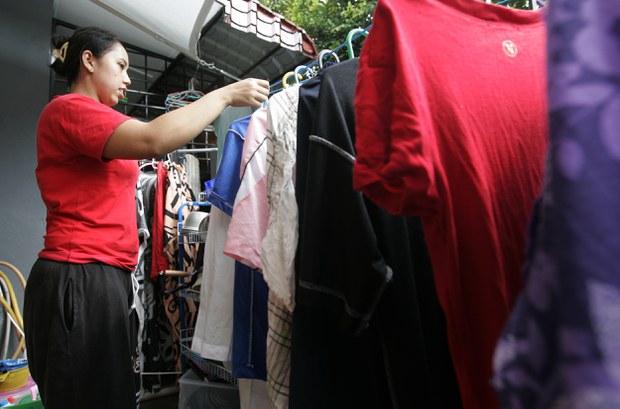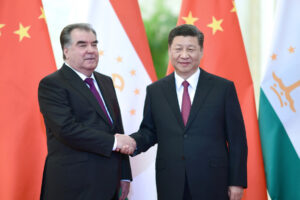Nearly a third of migrants employed as domestic help in Malaysia work under exploitative conditions, including high levels of isolation and restriction on their movement, the United Nations labor agency reported Thursday.
A study by the International Labor Organization, conducted between July and September 2022, also found several indicators of forced labor, including excessive working hours, unpaid overtime and low wages, among the workers it surveyed in Malaysia.
ILO surveyed 1,201 migrant women domestic workers in Malaysia, Singapore and Thailand, and found that 29% of workers in Malaysia reported conditions that fell under the agency’s definition of forced labor. In Singapore, that number was 7%, and in Thailand it was 4%.
“In Malaysia, the survey results indicate high levels of isolation and restriction on migrant domestic workers’ freedoms, including freedom of movement and freedom to change employer,” the study said.
“These are likely the result of the combined impact of a lack of labor protections in law, lack of enforcement of existing laws, lack of post-arrival orientation, and challenges to workers being able to change employers where work permits are tied to employers.”
Additionally, employers who want to prevent their domestic workers from leaving their employ sometimes lock them in or restrict their movement otherwise, the ILO study said.
It reported that 300,000-400,000 migrants worked as domestic help in Malaysia. Approximately 80% of them were Indonesian, 15% were from the Philippines and the rest were from Cambodia.
Migrant domestic workers, especially in Malaysia and Thailand, were mostly undocumented and unregistered and vulnerable because of not being fully protected by labor laws.
“[B]ut there is also evidence of substantial numbers of regular, full-time, live-in domestic workers in situations of forced labor and other forms of exploitation – with 27% of surveyed workers with regular status being in a situation of forced labor,” the study said.
BenarNews contacted Malaysia’s minister of human resources for comment, but did not immediately hear back.
Households in many Asian countries employ domestic help, often women from countries such as Indonesia, Myanmar, Cambodia and the Philippines, to carry out tasks such as child or elder care, cooking, cleaning, gardening and household management.
Malaysia for years has been under scrutiny for the alleged mistreatment of migrant labor, including the abuse of foreign domestic help.
Last July, Indonesia suspended sending workers to Malaysia, when it accused Kuala Lumpur of allegedly violating an agreement on recruiting workers and putting them at risk of being used as forced laborers. Indonesia resumed sending workers in August.
‘Domestic servitude’
Meanwhile, Malaysia rose one rank in the U.S. State Department’s 2023 Trafficking in Persons Report released Thursday, to the Tier 2 Watch List, from the bottommost Tier 3 spot it occupied for the last two years.
Countries on the Tier 2 Watch List are those whose governments do not fully meet the United States’ Trafficking Victims Protection Act of 2000’s minimum standards but are making significant efforts to bring themselves into compliance with those standards, the department said in its report.
In a special mention, the report noted that “domestic servitude” is a form of forced labor in which the trafficker requires a victim to perform work in a private residence.
“Such circumstances create unique vulnerabilities. Domestic workers are often isolated and may work alone in a house,” the U.S. report said.
“Foreign domestic workers are particularly vulnerable to abuse due to language and cultural barriers, as well as a lack of community ties. Some perpetrators use these types of conditions as part of their coercive schemes to compel the labor of domestic workers with little risk of detection.”
Referring to the U.N. labor agency’s study, Glorene A. Das, executive director of the labor rights group Tenaganita, said she believed that more than a third of foreign domestic help in Malaysia likely worked under exploitative conditions.
“I feel the number could be higher for those who are found to be in forced labor conditions,” she told BenarNews.
Indonesia’s ambassador to Malaysia, Hermono, who goes by one name, told BenarNews he was not surprised by the ILO’s findings.
“Most cases reported by our domestic workers are unpaid salary, excessive work, prohibition to communicate, and confiscation of personal documents,” he told BenarNews.
Indonesian President Joko “Jokowi” Widodo and Malaysian Prime Minister Anwar Ibrahim, during talks in Kuala Lumpur last week, “agreed to establish a special bilateral mechanism to resolve problems of Indonesian migrant workers,” the former said.
“Both leaders acknowledged the commitment of both parties to enhance the protection of human rights, welfare, and employment of all Indonesian migrants in Malaysia,” they said in a joint statement.
Source: Benar News















